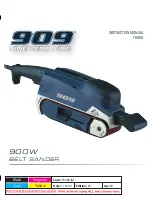
WARNING! DO NOT
sand any materials containing asbestos.
DO NOT
switch the polisher/sander on whilst the head is in contact with the work piece and avoid unintentional starting.
DO NOT
get the polisher/sander wet or use in damp or wet locations or areas where there is condensation.
DO NOT
allow untrained persons to operate the polisher/sander.
DO NOT
operate the polisher/sander when you are tired, under the influence of alcohol, drugs or intoxicating medication.
DO NOT
use the polisher/sander where there are flammable liquids, solids or gases such as paint solvents, etc.
DO NOT
leave the polisher/sander operating unattended.
DO NOT
carry the polisher/sander with your finger on the power switch.
DO NOT
pull the cord to remove the plug from the power supply.
Use a qualified person to lubricate and maintain the polisher/sander.
When not in use unplug from the mains power supply and store in a safe, dry, childproof area.
lEAD PAInT WArnIng!
Paint once contained lead as a traditional ingredient. Contact with the dust from the removal of such paint is toxic
and must therefore be avoided. The following action must be taken before using machine as a sander:
1.
User must determine potential hazard relating to age of paint to be removed. (Modern paints do not have lead content).
2.
DANGER!
Keep all persons and pets away from the working area. The following are particularly vulnerable to the effects of lead
paint dust: Expectant women, babies and children.
3.
We recommend personal protection by using the following safety items:
A) Paint Spray Respirator (Sealey ref. SSP1699) B) PE Coated Hooded Coverall (Sealey ref. SSP266). C) Latex Gloves (Sealey
ref. SSP24).
4.
Take adequate measures to contain paint dust, flakes and scrapings. Wear safety equipment, as in (3) above and thoroughly clean
all areas when task is complete.
5.
Ensure the paint waste is disposed of in sealed bags or containers according to local regulations.
3. TEChNICAL SpECIFICATIONS
2. INTRODUCTION
Features variable speed control ranging from 500 to 3200rpm - suitable for sanding and polishing. Alloy bevel gear head with composite motor
housing. Carbon brush caps for simple maintenance. Supplied with Ø170mm backing pad, polishing bonnet and side handle.
4. CONTENT & ASSEMBLY
4.1.
Content
4.1.1. Check the contents of the carton. If any item is missing or damaged contact
your supplier immediately.
Fig1. 1: polisher Unit
2: pad
3: Side handle
4: Nut
5: Lambs Wool Bonnet
6: Spanner (not shown)
4.2.
Assembly
WARNING! Ensure unit is not plugged into mains before attempting any assembly.
4.2.1. Attach the side handle (fig.1.3). Note: There is a mounting hole on either side and the top to suit the application and/or operator.
4.2.2. To attach the rubber pad, place the rubber pad on to the shaft, locating the groove in the pad onto the flats on the shaft (fig.2), fit the
nut and tighten using spanner by holding shaft steady with locking button (fig.3).
4.2.3. To fit a sanding disc: Select the grade of self adhesive sanding disc required, peel off the backing paper and centrally locate the disc
onto the pad.
4.2.4. To fit a polishing bonnet:
Fit the polishing bonnet over the secured rubber pad, using the pull cord tighten the bonnet and tie a bow to secure, tuck the loose
ends of the bow neatly under the bonnet.
Fig.1
1
Model . . . . . . . . . . . . . . . . . . . . . . . . . MS850pS
Nominal Power Rating . . . . . . . . . . . .1500Watts
Power Input. . . . . . . . . . . . . . . . . . . . . . . . . 230V
Speed Range . . . . . . . . . . . . . . . 500 - 3200rpm
Pad Size . . . . . . . . . . . . . . . . . . . . . . . . . 170mm
Sound Level . . . . . . . . . . . . . . . . . . . . 90.5dB(A)
Vibration Level . . . . . . . . . . . . . . . . . . . . 5.6m/s
2
Spindle . . . . . . . . . . . . . . . . . . . . . . . . . . . . .M14
Supply Lead . . . . . . . . . . . . . . . . . . . . . . . . . .2m
Weight. . . . . . . . . . . . . . . . . . . . . . . . . . . . 3.6Kg
3
2
3
4
5
Risk of hand Arm Vibration Injury
The MS850PS Variable Speed Sander/Polisher, when operated in accordance with these instructions and tested in accordance with BS EN
28662-1:1993, ISO 8662-1:1988 and BS EN ISO 8662-8:1997 results in the following vibration emission declared in accordance with BS EN
12096:1996.
Measured vibration emission value:
5.6m/s²
Uncertainty:
2.24m/s²
These values are suitable for comparison with emission levels of other tools that have been subject to the same test.
This tool may cause hand-arm vibration syndrome if its use is inadequately managed.
This is a ‘
NO LOAD’
vibration figure.
A competent person should carry out a risk assessment following HSE guidelines.
Measurement results can be highly variable, depending on many factors, including the operator's technique, the condition of the work
equipment, the material being processed and the measurement method.
Recommended Measures to reduce risk of hand-arm vibration syndrome:
We recommend appropriate safety equipment is utilised and regular breaks for the operator are employed to reduce any residual risk of
fatigue or repetitive strain injury.
Original Language Version
MS850PS Issue: 2 - 19/02/10





















